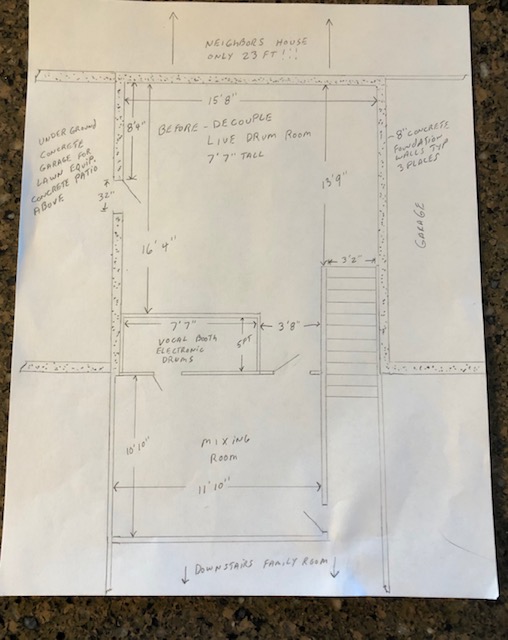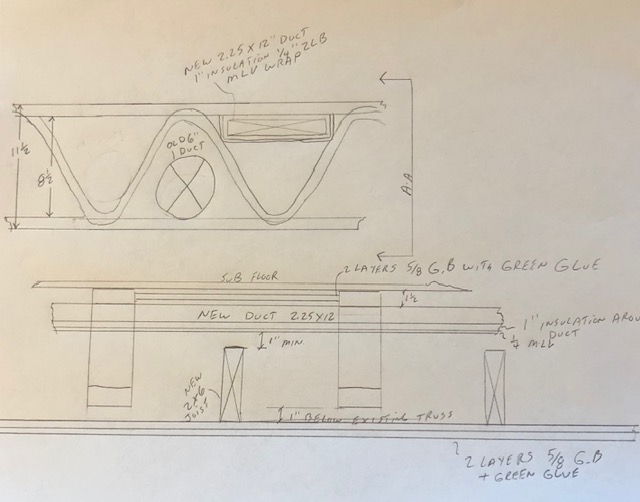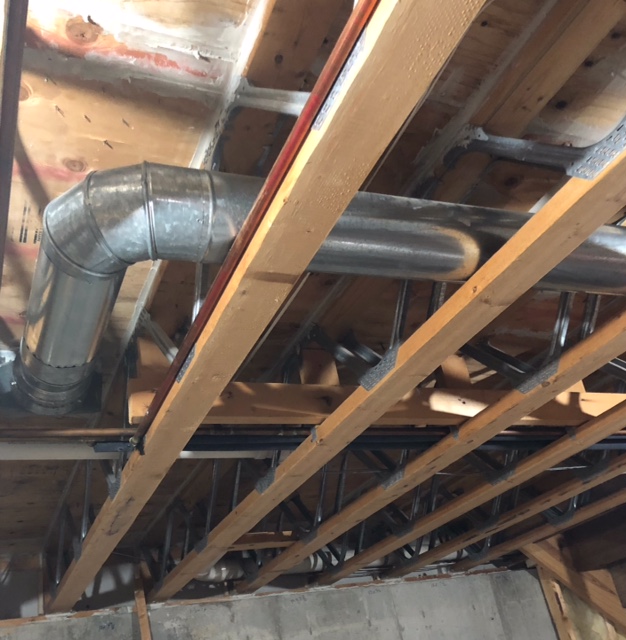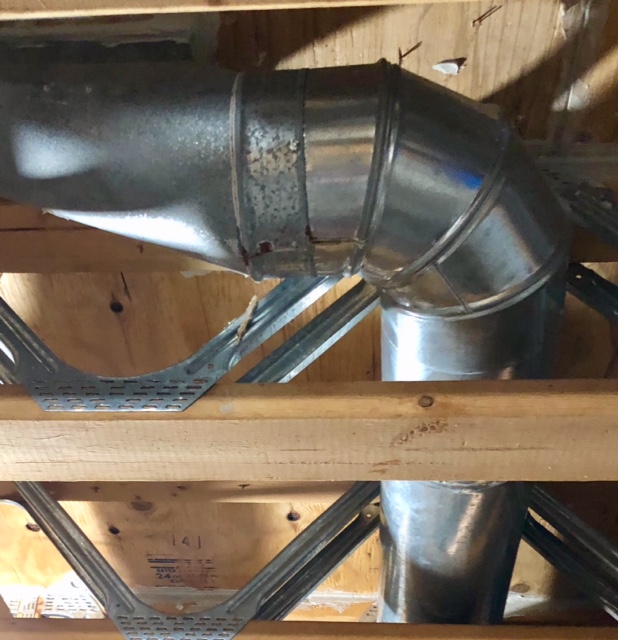I have some existing duct runs feeding my kitchen and laundry room. One 10ft long run and the other 6ft long run. They do not run parallel to the floor joist, so I cannot build a soffit like the normal way and box it in because of a door way and staircase. I’m stuck running the existing duct though the open web joist. I cannot add mass through the joist since the joist needs to flex as part of their design. I plan on using silencer boxes on the outside of the room and also inside. I’m looking for advice to solve this problem. Do I need 3 silencer boxes per run, one to go from outside live room, flex,then one inside live room then the last one to feed the upstair register? The duct in between the two live room silencer boxes will be just wrapped in insulation?
Comments
Thanks for the reply. I’m building a room inside a room. Beefing
Thanks for the reply. I’m building a room inside a room. Beefing up the subfloor now with 2 layers of 5/8 with green glue in between. This duct will exist above the new studio ceiling which will have the new 2x6 studio joist tucked up in between. The existing duct will be changed to 2.25 x12 so I can hug the subfloor and make room for the new joist for the studio ceiling. There is no way to run this existing duct around the perimeter in the new studio. I have a door and a staircase in the way. I have 3 concrete walls so there is only one way into the new studio. Open web joist are great for building houses being it lets you run plumbing and hvac through them but sucks trying to do a studio build lol.
So this is what I have to work with. I’m trying to keep my drums from going through this existing duct and into the rest of the house. From all my reading and investigating existing duct (which usually runs parallel with the joist) they should be insulated and add mass around it ( 1” mdf or 2 layers of 5/8 GB) then caulk seams.
I don’t have this luxury.
These are my obstacles, this duct will exist above the new studio ceiling and have to run through the joist. Should I put a silencer box right before it goes to the upstairs register and one as it leaves the live studio. If I isolate this duct at both ends of the live room then is there a reason to box it in the duct in between as it runs though the joist?
Also I will be using a mini split system for the new live room along with a ventilation system for fresh air.
These ducts don't draw or force air in to or outside the recordi
These ducts don't draw or force air in to or outside the recording space? I can't work out what the silencers would do? They normally prevent frequencies in the audio band from travelling in the airflow into the studio. In your case, if they carry noises from other rooms, that you are worried about getting into your new studio, then I'd box them in and fill that box with acoustic material to reduce any leakage from the metalwork. If they handled the airflow from your studio it would be different? Are you maybe intending breaking into the ducts to use to service your studio too? In this case silencers would be sensible, bit probably more from letting your studio noise back flow into the other rooms? I don't think we quite understand what the problem is you are trying to solve?
Maybe my post wasn’t clear. I’m trying to keep all my hard work

 Maybe my post wasn’t clear. I’m trying to keep all my hard work of isolating the live drum room from getting into the existing duct. The existing duct will live between the two leaves. Are you saying I don’t need silencer boxes as the duct penetrates the outer leaf ? My duct will penitrate the outer leaf above the vocal booth ( please see pic). I think I have found a work around. Stuart from John Sayers site suggested wrapping the duct in 1” insulation then wrap in 2lb MLV. This just might work for me. As you can see in the drawing my existing duct is 6” yet I only have 8 1/2” to work with and my new ceiling joist need to live up in that space. Changing the duct to 2 1/4 x 12 and wrapping it with MLV might give me what need. Everyone says just box it in and insulate, I only have 7’ 7” to bottom of existing joist so every inch matters on my new ceiling highth.
Maybe my post wasn’t clear. I’m trying to keep all my hard work of isolating the live drum room from getting into the existing duct. The existing duct will live between the two leaves. Are you saying I don’t need silencer boxes as the duct penetrates the outer leaf ? My duct will penitrate the outer leaf above the vocal booth ( please see pic). I think I have found a work around. Stuart from John Sayers site suggested wrapping the duct in 1” insulation then wrap in 2lb MLV. This just might work for me. As you can see in the drawing my existing duct is 6” yet I only have 8 1/2” to work with and my new ceiling joist need to live up in that space. Changing the duct to 2 1/4 x 12 and wrapping it with MLV might give me what need. Everyone says just box it in and insulate, I only have 7’ 7” to bottom of existing joist so every inch matters on my new ceiling highth.
So do I need silencer boxes as the existing duct penitrates the outer leaf? Thanks.
Silencer boxes work on audio frequencies inside the duct. There
Silencer boxes work on audio frequencies inside the duct. There seems no point whatsoever in quieting the contents of aircon to/from other spaces in the house. You just need to insulate the outside of them - which will be much, much easier and cheaper. Clearly - metal ducting will conduct the sound of a loud party in another space in the house. past your studio - so any sound treatment just needs to prevent this leaking in - so rigid coupling of the vac ducts to your studio inside structure is bad. If the mechanical transmission is sorted, then it's just airborne left to manage, and rock wool or similar should be sufficient. Difficult to be absolutely sure because I've never seen acoustic specs for sound travelling down an aircon duct, leaking out of it?
Silencers just work inside the ducts. They don't prevent leakage through them.
@JLDrumStudio Ive been dealing with my back back all week, whe
Ive been dealing with my back back all week, when i get i sec ill take a look at things and give a proper reply.
Having not read the entire thread, my quickest reply is from an isolation perspective, the ducting running above the studio ceiling, or below it in a soffit that is attached to the studio ceiling and with the same amount of mass is accomplishing the same thing. Either way keeps studio sound out of the ducting.
Will reply with a better response asap.
JLDrumStudio, post: 460538, member: 51506 wrote: I have some exi
JLDrumStudio, post: 460538, member: 51506 wrote: I have some existing duct runs feeding my kitchen and laundry room. One 10ft long run and the other 6ft long run. They do not run parallel to the floor joist, so I cannot build a soffit like the normal way and box it in because of a door way and staircase. I’m stuck running the existing duct though the open web joist. I cannot add mass through the joist since the joist needs to flex as part of their design. I plan on using silencer boxes on the outside of the room and also inside. I’m looking for advice to solve this problem. Do I need 3 silencer boxes per run, one to go from outside live room, flex,then one inside live room then the last one to feed the upstair register? The duct in between the two live room silencer boxes will be just wrapped in insulation?
I am a little late to the party... Have you considered duct board? I have no idea about HVAC codes in St. Louis, but in Texas, this is a common plenum material. https://www.homedepot.com/p/Master-Flow-20-in-x-25-in-Duct-board-Return-Air-Box-DRAB20X25/203613226?cm_mmc=Shopping|G|Base|All-Products|All|All|PLA|71700000014585962|58700001236285396|92700010802552403&gclid=EAIaIQobChMI4M_szd6s4QIVSrnACh2jhAMsEAQYASABEgKEOvD_BwE&gclsrc=aw.ds
Dale






Being unfamiliar with the overall design i can only make some ge
Being unfamiliar with the overall design i can only make some general remarks.
Can you re route the ducts to an area they wont interfere with the studio, or just higher up in the existing assembly?
If not you can route then thru the studio walls or ceiling, and just make a soffit around them. You can route them along the perimeter of the studio to save headroom in the middle, and even incorperate a bass trap design into the soffits protrusion.
All that said, im unclear as to why they are a problem to begin with since they are above the studios isolation assembly? Im guessing you are doing an independently framed ceiling, in which case the ducts interfere with the new framing for tbe ceiling.?